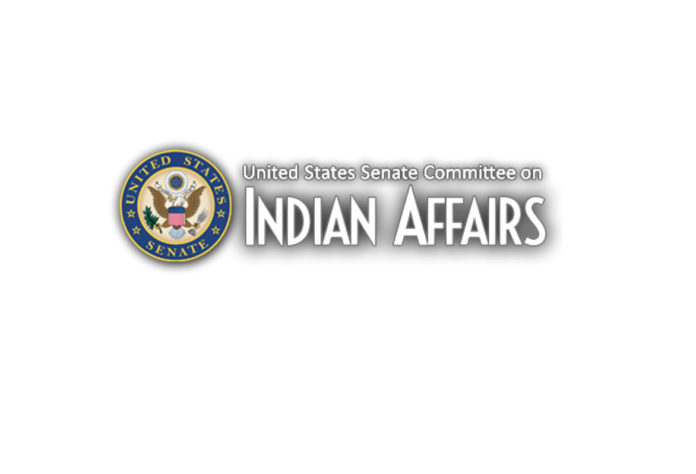WASHINGTON, D.C. – U.S. Senators Mike Rounds (R-SD) and Ben Ray Luján (D-NM), members of the Senate Committee on Indian Affairs, led a group of 34 senators in introducing bipartisan legislation to create a congressional charter for the National American Indian Veterans (NAIV).
Congress grants charters to recognize patriotic and national organizations that operate solely for charitable, literary, educational, scientific or civil improvement purposes. The NAIV serves the needs and interests of Native American veterans in collaboration with its national leadership and 14 regional offices. According to the Department of Veterans Affairs, there are more than 140,000 Native American veterans in the United States. While congressional charters have been granted to Italian-American, Polish-American and Catholic-American veterans groups, as of today, no Native American veterans’ organization has received one.
Headquartered in South Dakota on the Cheyenne River Sioux Tribal Reservation, the NAIV is a non-profit, non-partisan organization dedicated to advocating on behalf of tribal veterans. Originally established in 2004, today the NAIV serves the needs of Native American veterans in all 50 states. The NAIV formed as a result of a request by former Senators Daniel Akaka (D-HI), Daniel Inouye (D-HI) and Ben Nighthorse Campbell (R-CO) during a Senate Veterans’ Affairs Committee hearing in 2004.
Rounds first introduced this legislation, which grants a congressional charter for the NAIV, in the 116th Congress and again in the 117th Congress, where it unanimously passed the Senate.
“Native Americans serve in our nation’s military at five times the national average, and this charter would give them the recognition they truly deserve and have earned,” said Rounds. “There are many congressionally chartered veterans organizations, but none that solely represent the interests and needs of Native American veterans. Our bill would change that by recognizing the mission of the NAIV with a congressional charter. The NAIV works closely with Tribal Veterans Service Officers to make certain Native American veterans receive proper benefits and resources. Congress regularly looks to the NAIV for input when addressing issues facing Native American veterans. This charter will help give the NAIV a larger platform to continue advocating for and serving the more than 140,000 Native American veterans living in the United States.”
“Native Americans have served our nation honorably in the Armed Forces – often times at higher rates than any other demographic,” said Luján. “I’m proud to introduce bipartisan legislation to create a Congressional Charter for the National American Indian Veterans Organization. NAIV is a crucial resource for Native veterans that delivers critical assistance and ensures that they have access to the benefits that they have earned. As a member of the Senate Committee on Indian Affairs, I’ll continue fighting to fulfill the commitment our nation made to Native veterans.”
Companion legislation was introduced in the House by Representative Dusty Johnson (R-SD), Sharice Davids (D-KS), Tom Cole (R-OK), Melanie Stansbury (D-NM) and Barbara Lee (D-CA).
“Polish-American, Italian-American, Jewish, and Black veterans’ groups all have established Congressional Charters, yet no Congressional Charters have been designated for Native veterans’ organizations,” said Johnson. “Native Americans serve in our military at five times the national average, establishing federal recognition for NAIV is the right thing to do.”
This legislation has been endorsed by the Cheyenne River Sioux Tribe, Oglala Sioux Tribe, Rosebud Sioux Tribe, Sisseton Wahpeton Sioux Tribe, Coalition of Large Tribes, National Congress of American Indians (NCAI), Military Order of the Purple Heart, Korean War Veterans of America, National Association of State Directors of Veterans Affairs, Vietnam Veterans of America, American Gold Star Mothers, Jewish War Veterans of the USA, Navajo Nation, Inter-Tribal Council of the Five Civilized Tribes, Cherokee Nation, Chickasaw Nation, Choctaw Nation, Muscogee (Creek) Nation, Seminole Nation, Blackfeet Nation, Crow Nation, Eastern Shoshone Tribe, Fort Belknap Indian Community, Mandan, Hidatsa and Arikara Nation, Northern Arapaho Tribe, Shoshone-Bannock Tribes, Spokane Tribe, Ute Indian Tribe, Jena Band of the Choctaw Indians, Poarch Band of Creek Indians, Mohegan Tribe, Catawba Nation, Lumbee Tribe of North Carolina, Southern Ute Indian Tribe, and Bois Forte Band of Chippewa.















































